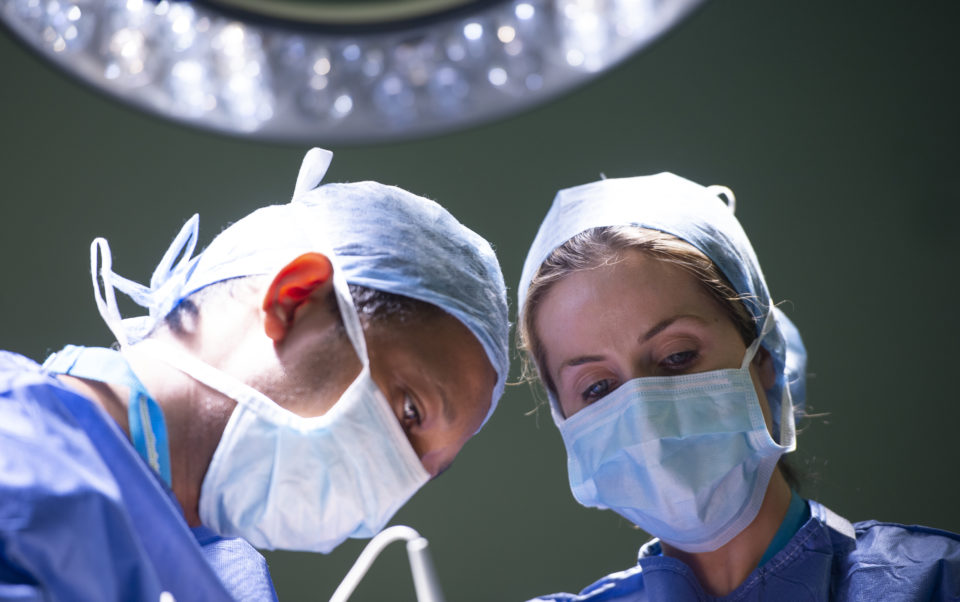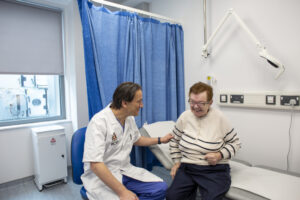Types of CancerNavigation
Cancer Surgery

Cancer Surgery is an operation to remove part of your body to diagnose or treat cancer. As well as the tumour, your surgeon will remove some tissue around it, in case any cancer cells have spread there. The area around the tumour is called the margin. Your surgeon may also remove lymph nodes around the tumour area. Again, this is because they may contain cancer cells if the cancer has started to spread.
The cells from the margin and / or lymph nodes will be examined after surgery to see if they have cancer cells in them. If they do, you may have other treatments such as radiotherapy or chemotherapy. This is called adjuvant treatment. Sometimes you will have radiotherapy and/or chemotherapy before surgery to shrink the cancer so it’s easier to remove. This is called neo-adjuvant treatment.
The type of surgery you have done will depend on the type of cancer you have as well as your general health. Surgical procedures may be carried out in a Drs Office, as a day case procedure in a surgical day ward or endoscopy department, or you may need to be admitted to a hospital ward for a number of days.

After your initial surgery you may be offered plastic or reconstructive surgery. Plastic and reconstructive surgery aims to restore form and function to affected areas following injury. Surgical removal of cancer may result in a loss of function or a visible defect in the body. Repair of cancer wounds is aimed primarily at restoring form and function or simply achieving wound closure.
Reconstructive surgery can be required for all areas of the body, from the face to the toes. A variety of methods ranging in complexity from minor skin reconstruction to major limb reconstruction are utilised at our Cancer Centre.
The Plastic and Reconstructive team here at Beaumont RCSI Cancer Centre consists of six full time consultants each with their own individual expertise in various disciplines of plastic surgery. The variety of the internal disciplines (hand surgery, breast surgery, skin surgery, head and neck surgery) allows for a tailored approach to all reconstructions.
Microsurgical reconstruction is the most complex of all reconstructions. This surgery involves using tissue from a distant part of the body (skin/fat/muscle etc). This donor tissue is isolated on its blood supply and disconnected temporarily. The tissue is then transferred to the defect resulting from the cancer removal. The bloods vessels in the tissue are then surgically connected to new blood vessels within the defect using a microscope. This type of reconstruction allows closure and repair of even very major defects.
To find out more about surgery and your type of cancer CLICK HERE.
-
What are the reasons for Cancer Surgery?
- Diagnosis:Your doctor may use a form of cancer surgery to remove all or part of a tumour so it can be studied under a microscope to see if it is cancerous (malignant) or noncancerous (benign).
- Staging:Cancer surgery helps your doctor define how advanced your cancer is by checking the size of your tumour and determine whether it’s travelled to your lymph nodes. Other tests or scans may be needed to determine your cancer’s stage and whether it has spread to other organs in the body.
- Primary treatment:For many tumours, cancer surgery is the best chance for a cure, especially if the cancer is localized and hasn’t spread.
- Debulking:When it’s not possible to remove all of a cancer, your doctor may remove as much as possible in order to make chemotherapy or radiation more effective.
- Relieving symptoms or side effects:Sometimes surgery is used to improve your quality of life rather than to treat the cancer itself. For example, to relieve pain caused by a tumour that’s pressing on a nerve or bone or to remove or bypass a tumour that’s blocking your intestine.
- Cancer prevention: If you have a high risk of developing cancer in certain tissues or organs, your doctor may recommend removing those tissues or organs before cancer develops. For example, if you are born with a genetic condition called familial adenomatous polyposis, your doctor may use cancer surgery to remove your colon and rectum because you have a high risk of developing colon cancer.
-
Types of Surgery Procedures
Many different surgery techniques are used in Beaumont Hospital depending on the type of cancer you have, its location and stage of your cancer. You can find out more about the types of surgery used for your tumour by clicking here.
Some procedures are minimally invasive, i.e. use small incisions and few stitches and can be done as day cases or require a short hospital stay. Other procedures use open surgery, where a larger cut (incision) is used to view and remove your cancer. This requires a longer stay in hospital to recover.
-
Examples of Minimally Invasive Surgery
Some surgical procedures may be done in Clinic or on a ward where you are admitted and discharged on the same day.
Examples
- Removal of a small skin tumour during your visit to the outpatient clinic.
- Removal of a colon polyp cancer in the endoscopy department where you are admitted for the day.
Some surgical procedures require you to be admitted for a number of days.
Examples
- Laparoscopic surgery (also known as keyhole surgery).A surgeon uses a laparoscope to see inside your body without making large incisions. Instead, several small incisions are made and a tiny camera and surgical tools are inserted into your body to remove the tumour. The surgeon watches a monitor that shows what the camera sees inside your body. The smaller incisions mean faster recovery and a reduced risk of complications. Laparoscopic surgery is used in cancer diagnosis, staging, treatment and symptom relief.
- Robotic surgery. This is a type of keyhole surgery where the surgical instruments are moved by robotic arms controlled by the surgeon. The surgeon sits away from the operating table and watches a screen that projects a 3-D image of the area being operated on. Robotic surgery is currently used in Beaumont Hospital to treat some prostate and oesophageal cancers and has recently started being used for colorectal surgery.
Note: Sometimes your Doctor will have to switch from a keyhole or robotic surgery to an open surgery during your procedure for your safety. This is sometimes because they need to get better access to a tumour. It means that you will have a larger incision (wound) after the surgery.
-
Examples of Open Surgery
Open Surgery involves making a larger cut (incision) in your body to remove your cancer. This type of surgery is sometimes used where the surgeon needs a larger view of your cancer or more room to remove it and involves a longer stay in hospital. Another reason is that they may need to remove more than one organ. For larger surgeries like this more than one speciality of surgeon may be needed to during the operation.
-
Before you have Surgery
You may have certain tests, such as blood tests, urine tests, an electrocardiogram of your heart to check your heart rhythm, X-rays and other imaging tests before your surgery. These tests help your team assess your surgical needs, such as your blood type should you need a transfusion, and identify any potential risks, such as infections.
Information about the risks benefits and possible alternatives to surgery will be discussed with you and you will have the chance to ask any questions you may have.
If your surgery is planned you will be seen in the outpatient clinic by the Surgeon and the Clinical Nurse Specialist. The team will organise any preoperative tests you need or refer you to a preassessment clinic, or to see an Enhanced Recovery Nurse to have these done. If you surgery is an emergency you will meet your surgeon and the clinical nurse specialist as an inpatient.
-
Coming into Hospital
Wherever possible patients are admitted on the day of surgery through the Day of Surgery Admission Unit (DOSA). For more information about DOSA CLICK HERE.
Occasionally you may have to be admitted in the days before your surgery if your medical condition or needs are more complex.
-
Questions you may wish to ask about your Surgery
CLICK HERE if you wish to print a copy of these questions.
Treatment choice
- Why do I need to have surgery?
- Do I have a choice of other treatments?
- How successful is this type of surgery for this type of cancer?
- Will I need other treatment before or after surgery?
The surgery
- What type of surgery will I have, e.g. open surgery or keyhole surgery?
- What exactly will you do during the operation? Will you remove part or all of the cancer?
- How long will the surgery take?
- Could your plans to operate on me change? Why?
- What are the potential risks and complications?
- Do you have an information leaflet about the surgery I will be having done?
Side effects and recovery
- What way will this surgery affect me?
- Will I have tubes and drains?
- Will I have any pain? How will it be managed?
- How long will I be in hospital?
- Who can I contact if I have problems when I go home?
- How often will I need check-ups?
- What kind of support is available to people who have this type of surgery?
Information about the Team
- Who will be involved in my care?
- Who can I contact before I have surgery if I have questions?
-
Head and Neck Reconstruction
Cancers of the head and neck can involve a number of highly specialised parts of the body for example the mouth or the eye. This results in a need for complex reconstructions due to the need to individually repair each structure. We work closely with our colleagues in the departments of neurosurgery and head and neck surgery for the majority of these cases. Each case is unique and reconstruction can range from a simple skin graft to major microsurgical reconstruction.
A specialist head and neck reconstruction clinic is run every week. Our Consultant Plastic Surgeons who specialise in reconstruction of the Head and Neck are: Mr Barry O Sullivan and Mr Fiachra Martin.
-
Breast Reconstruction
Breast cancer reconstruction is an option that many women choose to undertake during their cancer treatment. Patients choose from a variety of methods of reconstruction prior to the operation. Different patients are suited to different reconstruction either due to patient preference, body type or cancer treatment priorities.
Immediate reconstruction is when a new breast is created during the operation to remove the cancer. In some women, a delayed breast reconstruction is preferable. This is performed at a later stage once all cancer treatment is complete and the patient has progressed to annual surveillance. Beaumont RCSI Cancer Centre is proud to be at the forefront of breast reconstruction in Ireland offering the full range of reconstructive options.
A specialist breast reconstruction clinic is run every week. Our Consultant Plastic Surgeons who specialise in breast reconstruction are: Mr Nadeem Ajmal and Mr Jamie Martin Smith.
For more information about breast reconstruction click here

